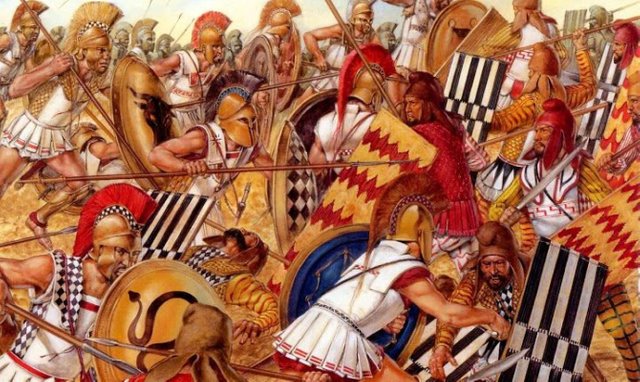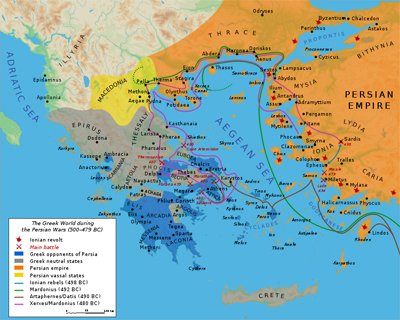History 101. Battle of Marathon part1
As I have said in my introduction, history is one of the most important things to me and I decided to share my knowledge with you.
I want to present the battles that had a big impact in history, from the battle of Marathon up until the modern conflicts.
The age of the sword
The individual warrior dominated much of warfare in the Ancient and Medieval eras, often fighting in massed, ill-disciplined hordes. It was the rise of Sparta in Ancient Greece that showed what a professional, disciplined force of heavily armed infantry could do in the face of superior numbers and this was brought to climatic fruition with Alexander the Great's seemingly-invincible Macedonian phalanxes. Later, the Romans created the most complete, efficient professional army of the Ancient era: their use of well-drilled, tightly packed infantry cohorts dominated the battlefields of Europe and the Mediterranean for centuries.
However, with the demise of the Roman empire, military technology and professionalism regressed - only the Normans and Byzantines kept the tradition of the professional soldier alive. From the fourteenth century onwards, during the High Middle Ages, professional armies again began to dominate the battlefield, and, as seen at Agincourt (I will go in detail in a further post), such armies could decisively defeat a numerically superior foe.
As there is a lot of information on each and every battle that I am going to talk about, I will split them in parts, and their number will depend on the amount of information that I currently have on them. I hope you will enjoy. Let's begin!
Battle of Marathon 490BC

At Marathon, an outnumbered force of Greek hoplites seized a chance to defeat their Persian foes, exploiting their superior armour and discipline to win one of the most famous tactical victories of the Ancient World. It was, however, not the end of the Persian threat to the independent Greek city-states.
Context
By 539BC the Persians under Cyrus the Great had conquered much of Anatolia, including those Greeks living in Ionia on the coast. Initially, relations between the Persians and their Greek subjects were relatively cordial. Over the course of the next several decades a number of tensions emerged which soured that relationship. The Persians impeded the Greeks' economic development with trade restrictions. Moreover, the autocratic Persians imposed puppet tyrants on the Ionian city-states - something antithetical to the independent-minded Greeks. In 499BC the Ionians finally broke into open revolt against the Persians. Their leader, Aristagoras of Miletus sought aid from the states on the Greek mainland. His first attempt to secure allies was with Sparta. The Spartans had the best army in Greece and so were a good choice. Unfortunately, King Cleomenes did not see how sending forces to fight for the far-off Ionian Greeks was in the Spartans' interest and so declined to support the revolt. Aristagoras received a better reception in Athens. He made a speech to the Athenian assembly where he argued that the Persians were inferior to the Greeks in battle and that the wealth of the great empire would provide much loot for the victors. The assembly debated the issue and decided to send aid to their Ionian cousins - a squadron of 20 warships. The Greek armada put in at Ephesus where its troops were landed. The army proceeded to the Persian capital, Sardis, and the city was quickly taken and, with a Persian army approaching, burned to the ground. In a subsequent battle, the Greeks were defeated and the Athenians decided to return home. The revolt continued until 493BC but the result was a foregone conclusion - the powerful and centralized Persian armed forces outclassed the individualistic Greek states in fighting a protracted war. Although the revolt had been successfully suppressed, the Persian Great King, Darius I, had learned about the participation of the Athenians and was livid. A story by Herodotus recounts how Darius had a slave tell him 'Master, remember the Athenians' three times before dinner lest he forget to punish them for their interference. And so, in 492BC Darius sent an expedition under his son-in-law Mardonius to do just that but hostile tribesmen in Thrace and bad weather off Mount Athos, necessitated the forces return home.
Marathon facts
Who
Nearly 11,000 Athenians and Plataean hoplites, led on the day of the battle by the Athenian general Militiades, were opposed by a multi-ethnic Persian army numbering perhaps 25,000, under the command of the Persian Artaphernes and the Median noble Datis.
What
The Athenians weakened the centre of their line and strengthened their wings, allowing the Persians to push through the centre, only to be defeated on the flanks and have their centre enveloped by the victorious wings of the Greek army.
Where
The Plain of Marathon, about 26miles from Athens
When
12 August 490BC
Why
The Persians wanted to attack Athens to punish the city for its support for the rebellion of the Ionian Greek cities.
Outcome
The Persians were driven from Greece for 10 years.
